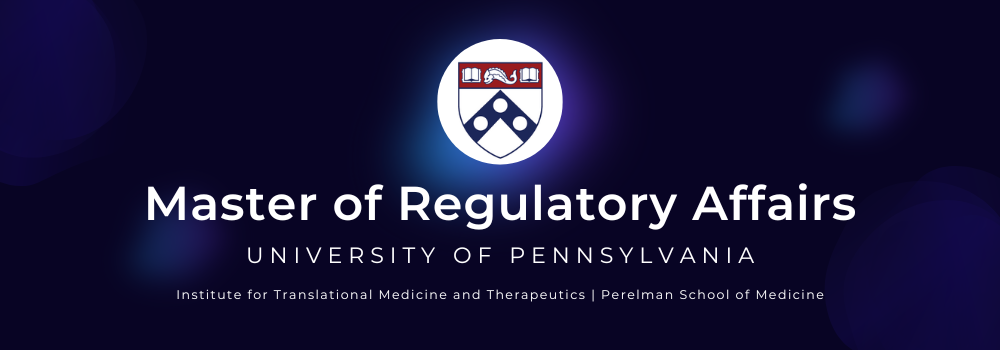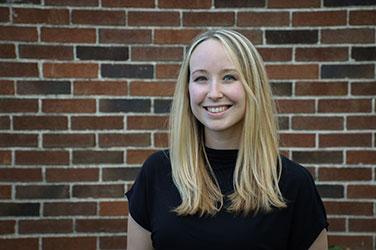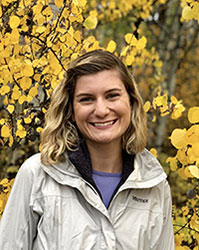- ITMAT Home
- Education Overview
- Education & Training Programs
- Clinical Research Professionals
- Master of Regulatory Affairs
- MRA Outcomes & Alumni
MRA Graduate Spotlight

Return to MRA Program Overview
Click each dropdown to learn more about the MRA graduates of recent years.

Current Position: Clinical Research Program Manager, The Children’s Hospital of Philadelphia
What attracted you to the MRA program?
The courses covered under the MRA program are very relevant in today’s rapidly changing clinical research environment and drug development landscape. The program solidified my clinical research fundamentals and helped me grow in my prior role as a clinical research coordinator.
What have you enjoyed most about the MRA program?
Interacting with peers from various backgrounds, the open discussions surrounding hot topics in clinical research and the opportunity to interact with established faculty members are some of the aspects that I enjoyed the most about the MRA program. Being a research professional in a straightforward biorepository study, this program was very valuable as it opened a multitude of different types of protocols and study designs for me to review and understand.
How did the MRA program helped further your research and career goals?
My capstone project which focused on “Privacy in pediatric genomics” played a big role in my promotion to a Program Manager role in an institutional genomic data repository. Ultimately, this degree has made me a better clinical research professional with the ability and confidence to navigate uncertainties that we face in our daily work.

Current Position: Senior Regulatory Affairs Specialist at Gene Therapy Program
What attracted you to the MRA program: While working in manufacturing, I began working on a project dealing with cleanroom development, and that is what pushed me to want to pursue a Master in Regulatory Affairs. There were 3 main things that attracted me to this program specifically: flexibility, faculty, and curriculum. Most of the classes throughout the program were scheduled in the evening, which allowed for ample flexibility. This allowed me to be able to continue my full-time job while furthering my education. It also allowed me time to be able to participate in a shadowing opportunity, which really helped me decide what I wanted to do with my career after graduation. Classes were taught by faculty and people in the biopharmaceutical industry that were leading experts in their fields. It allowed me to expand my knowledge into different regulated fields (ex. devices, combination products, and biologics) and expand my network. Lastly, the curriculum within the MRA program was really intriguing to me. I liked that they had 2 concentrations you could pick from to go along with the MRA degree. I was able to get a concentration in Quality Assurance which is something I have always had interest in, and I was given the opportunity to improve my risk-based analysis skills all while obtaining my regulatory degree.
What you enjoyed most about the MRA program: I enjoyed the MRA curriculum the most! It exposed me to many different aspects of drug development. I was able to gain experience of what it takes to go from having an intellectual property all the way through the submission process for a drug, device, or combination product. There were a plethora of guest lecturers which added a lot of value to class discussions and the overall learning experience within the MRA program. There were also many group projects, which helped prepare me for my current job. It gave me experience with presenting, answering questions and interpreting critical feedback. This prepared me for agency meetings that we may have during the pre-IND and IND submission process.
How the MRA program helped further your research and career goals: The MRA Program allowed me to finally take a step out of the lab and into the field I’ve always wanted to be in. I was able to accept a new position where I help with writing preclinical study reports and IND applications.

Current Position: Senior Specialist, Global Labeling Lead at Merck
What attracted you to the MRA program: The MRA program provided me with an opportunity to transition from a bench scientist into a regulatory professional. Similarly to other students, I was working in the lab when I started to learn about the field of regulatory affairs. I knew this program could provide me the foundation to begin a regulatory career.
What you enjoyed most about the MRA program: I loved building connections with leaders in the regulatory field, as well as building connections with classmates. Many of the courses are led by current regulatory professionals, who are able to provide real-world applications of course material.
How the MRA program helped further your research and career goals: The curriculum of the MRA program helped further my career by providing supplemental information to regulatory interactions in the workplace, giving me more confidence in my own work while interacting with regulatory professionals. Also, the connections made during my time in the MRA program led me directly to my next career move!

Current Position: Global Regulatory Affairs Manager at Nuvalent
What attracted you to the MRA program: I was attracted to the MRA program due to the variety of courses that were offered and also due to the various professors that were teaching these courses. They were industry professionals who brought a wealth of knowledge to the program
What you enjoyed most about the MRA program: The thing I enjoyed the most about the MRA program was the people I met! The MRA program brought a wonderful network of people into my life between professors, industry professionals, and my fellow classmates. We are all still connected a year out of the program.
How the MRA program helped further your research and career goals: Through the MRA program I was able to utilize different regulations regarding rare diseases and orphan indications in my work. I also learned how to blend different areas of drug development together and make it very interdisciplinary at work. This allowed me to teach my direct reports about regulatory affairs.

Current Position: Manager, Translational Science at Allogene Therapeutics
What attracted you to the MRA program: I was drawn to the MRA program because of the flexibility it offered in conjunction with the expertise of the instructors. Additionally, I was interested in learning more about regulatory affairs so that I could better understand the drug development process and help to move novel cell and gene therapies from the bench into the clinical setting.
What you enjoyed most about the MRA program: I really enjoyed the collaborative learning environment that the MRA program offered. The courses and projects were focused on real-world scenarios and working with a team which greatly mimics drug development outside the classroom.
How the MRA program helped further your research and career goals: The knowledge, skills, and connections I made while enrolled in the MRA program have allowed me to move into a more central role in the drug development process. This allowed me to become involved in clinical science, regulatory, and strategy at my current position, greatly expanding my skill set and development.

Current Position: Regulatory Affairs Associate at Lungpacer Medical Inc
What Attracted Me to the MRA Program: I was interested in the field of compliance but was not sure which direction I should take that interest. After some research, I found the MRA program. A Masters in Regulatory Affairs caught my eye because of the variety of specializations within the field itself. The degree could provide a foundation that I could tailor to my own preferences from a professional standpoint.
What I enjoyed most about the MRA Program:
I most enjoyed the opportunity to engage with regulatory affairs professionals. The program offered access to high-level members of both industry and academia, who were always friendly, informative, and accessible. I also enjoyed the opportunity to gain working experience through a collaborative MRA-OCR internship at Penn.
How the MRA Program helped further my Research & Career Goals: Through the MRA program, I was able to clarify my goals and take the next step in my career. I knew that I wanted a career in compliance, but I was not sure which area of compliance best suited my interests. Early on in the MRA program, I found that medical devices consistently drew my attention. I was able to focus some of my coursework, including my capstone project, on medical devices to support my future in the medical device space.
The MRA program also provided me with an opportunity to gain professional experience through an internship in collaboration with the office of clinical research. This was valuable for my understanding of the Regulatory Affairs field and the interview process for prospective positions. I was able to obtain a position as a Regulatory Affairs Associate at a small medical device company and am excited to take the next step in my career.

Current Position: Associate Consultant at ZS
What Attracted Me to the MRA Program: After college, I knew I wanted to pursue a graduate degree and there are many different paths that you can take at the onset of a career in clinical research. While working at the Children’s Hospital of Philadelphia, my manager suggested that I consider the program at Penn based on my interest and experience in conducting clinical trials with investigational devices. After researching the program, I thought the program goals and focus would be an excellent complement to my career interests and ambitions.
What I enjoyed most about the MRA Program:
The opportunity to study at a world-class institution like the University of Pennsylvania is invaluable in many ways. The program provided me with unparalleled access to the brightest minds in the field. Many of the professors are industry professionals with whom you can network and discuss future career ambitions or perspectives on the current regulatory landscape. I enjoyed the camaraderie that developed between the members of my cadre. We each had similar interests in the program and different clinical backgrounds which allowed us to learn from one another and share our diverse insights during classroom discussions. I also truly enjoyed working with my capstone advisor. The opportunity to learn one-on-one from an expert in my project area and the mentorship she provided, and continues to provide, are one of the highlights of the program for me.
How the MRA Program helped further my Research & Career Goals: The comprehensive graduate program has equipped me with the tools and knowledge that I needed to grow professionally. While the program is an education program, the professors also help you to grow professionally and the capstone project proves you with an opportunity to explore a topic of your interest in depth beyond the standard curriculum. As a result of the professional relationships I built during the program, I was offered a position that has launched my career in regulatory affairs and expedited my career trajectory.

Current Position: Regulatory Affairs Specialist at Organogenesis, Inc.
What Attracted Me to the MRA Program: Regulatory Affairs had been an area I was interested in since interning at a Pharma company in college, but I wasn't sure how to make the transition from being a scientist in the lab to a role in regulatory. When I saw that Penn was offering a Masters in Regulatory Affairs degree, I knew it would be a great opportunity for me to move into the world of regulatory and that it would provide me with the opportunity to build on the knowledge I already had and put it into action as a regulatory professional.
What I enjoyed most about the MRA Program: One of my favorite aspects of the MRA program was taking classes with professors who had a wide breadth of real-world expertise. My professors throughout the program had experience working in regulatory affairs in academia, at biotechs, or at pharma companies, and were able to share their experiences and offer insight on how the material we were learning would be put into use when in a regulatory affairs role.
How the MRA Program helped further my Research & Career Goals: I knew that upon graduating from the MRA program I wanted to transition into a regulatory career within the industry. The MRA program gave me not only the knowledge I needed to succeed in finding the right position, but also the confidence to do so. It was wonderful to go into interviews and be able to confidently converse and be a part of a meaningful dialogue concerning topics that were covered in the program.

Current Position: Labeling Specialist at ZimVie Spine
What Attracted Me to the MRA Program: When it came to the decision to continue my education or not, I was pleasantly surprised to find that Penn offered a degree which seemed to fit perfectly with my current role as Quality Assurance in a preclinical research laboratory and future career aspirations in drug development. The MRA program stood out to me as offering a wide breadth of coursework while still providing sufficient flexibility in its hybrid in-class/online curriculum for students working full time.
What I enjoyed most about the MRA Program: I enjoyed how the MRA program offered in-depth exposure to many aspects of clinical research and drug development which are far outside of the scope of my current job responsibilities. The sheer variety of instructors and guest lecturers from industry was excellent and made for an engaging learning experience.
I also very much enjoyed getting to know the other students in my cohort, all of whom worked in many interesting fields at Penn. The small cohort sizes and discussion-based courses seemed to lend themselves well to building strong relationships with my classmates.
How the MRA Program helped further my Research & Career Goals: The MRA program has given me a completely new level of understanding of my industry, which has allowed me to approach my role in a different way. I am now able to meaningfully convey the "bigger picture" to our preclinical research staff during training sessions and better interface with my laboratory's collaborators and sponsors. The MRA program has provided me with the diversity of knowledge and experience to both excel in my current role and open doors for career opportunities in the future.

